

WEF New Vision for Education. New Vision for Education: Fostering Social and Emotional Learning Through Technology. The New Vision for Education project examines the role that technology can potentially play to improve education for the future.
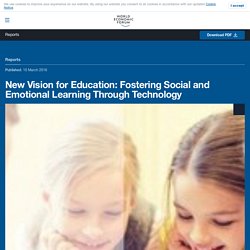
In phase II, we investigated innovative ways to help students develop competencies* and character qualities** broadly defined as social emotional skills, which are critical components of 21st century skill framework but not a core focus in today’s curriculum. 16 skills students need to learn today to thrive tomorrow. The gap between the skills people learn and the skills people need is becoming more obvious, as traditional learning falls short of equipping students with the knowledge they need to thrive, according to the World Economic Forum report New Vision for Education: Fostering Social and Emotional Learning Through Technology.
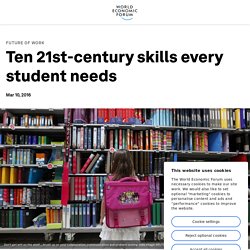
Today's job candidates must be able to collaborate, communicate and solve problems – skills developed mainly through social and emotional learning (SEL). Combined with traditional skills, this social and emotional proficiency will equip students to succeed in the evolving digital economy. What skills will be needed most? An analysis of 213 studies showed that students who received SEL instruction had achievement scores that averaged 11 percentile points higher than those who did not. And SEL potentially leads to long-term benefits such as higher rates of employment and educational fulfillment. 25 Ways to Develop 21st Century Thinkers. The need to develop critical thinkers has never been as urgent as it is now.
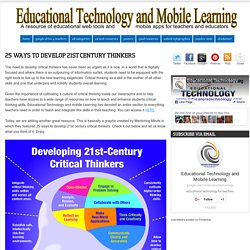
In a world that is digitally focused and where there is an outpouring of information surfeit, students need to be equipped with the right tools to live up to the new learning exigencies. Critical thinking as a skill is the mother of all other skills and one that underpins and solidify students overall learning. Given the importance of cultivating a culture of critical thinking inside our classrooms and to help teachers have access to a wide range of resources on how to teach and enhance students critical thinking skills, Educational Technology and mobile Learning has devoted an entire section to everything teachers need in order to teach and integrate this skills in their teaching.
You can access it HERE. Today, we are adding another great resource. Courtesy of: Mentoring Minds. Misurare le competenze per il XXI° secolo. Le competenze che gli studenti devono possedere Quali sono le competeze essenziali per il XXI secolo?
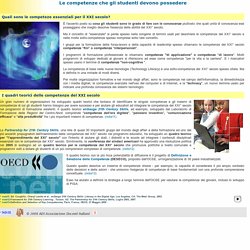
È l'accento posto su cosa gli studenti sono in grado di fare con le conoscenze piuttosto che quali unità di conoscenza essi posseggano che meglio descrive l'essenza delle abilità del XXI° secolo. 35070367. 16 competenze da sviluppare a scuola (secondo il WEF) L’economia dell’innovazione sta cambiando il mondo.
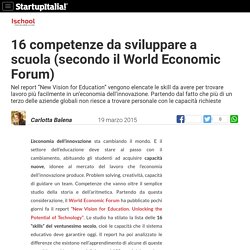
E il settore dell’educazione deve stare al passo con il cambiamento, abituando gli studenti ad acquisire capacità nuove, idonee al mercato del lavoro che l’economia dell’innovazione produce. Problem solving, creatività, capacità di guidare un team. Competenze che vanno oltre il semplice studio della storia e dell’aritmetica.
Partendo da questa considerazione, il World Economic Forum ha pubblicato pochi giorni fa il report “New Vision for Education. Unlocking the Potential of Technology”. Oggi il lavoro richiede un mix di competenze più variegato rispetto al passato. Prendendo come unità di misura alcune di queste competenze, il report ha rivelato enormi differenze tra le competenze degli studenti, non solo in aree come la matematica e la scienza, ma anche in creatività e pensiero critico.
What is the difference between ‘Skills’ and ‘Competencies’? - Royall. Difference between Skills and Competencies - american english. Skills Or Competencies...What's The Difference? - HRTMS.com. Skills vs Competencies. What’s the Difference? - TalentAlign. The terms Skills and Competencies are used, virtually, interchangeably.
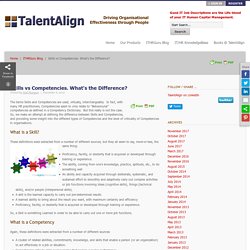
In fact, with many HR practitioners, Competencies seem to only relate to “Behavioural” competencies as defined in a Competency Dictionary. But this really is not the case. So, we make an attempt at defining the difference between Skills and Competencies, and providing some insight into the different types of Competencies and the level of criticality of Competencies in organisations. What is a Skill? These definitions were extracted from a number of different sources, but they all seem to say, more-or-less, the same thing: So, a Skill is something Learned in order to be able to carry out one or more job functions.
What is a Competency Again, these definitions were extracted from a number of different sources: Competencies, therefore, may incorporate a skill, but are MORE than the skill, they include abilities and behaviours, as well as knowledge that is fundamental to the use of a skill. Thoughtful Learning: Curriculum for 21st Century Skills, Inquiry, Project-Based Learning, and Problem-Based Learning. The 21st century skills are a set of abilities that students need to develop in order to succeed in the information age.
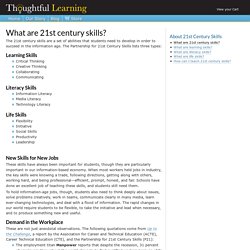
The Partnership for 21st Century Skills lists three types: Learning Skills Critical Thinking Creative Thinking Collaborating Communicating Literacy Skills Information Literacy Media Literacy Technology Literacy. Framework for 21st Century Learning. Educational Technology Resouces on Pinterest.
PeriodicPlay_Final_loRes-01.png (immagine PNG, 13500 × 5400 pixel) - Riscalata (10%) Immagine JPEG, 428 × 224 pixel) Gears (PNG Image, 994 × 739 pixels) Main-qimg-9bd27011556d4266f98d130ade20c054 (PNG Image, 485 × 330 pixels) 21st Century Competencies_ A Guide to Planning Instruction for 21st Century Learners.jpg (JPEG Image, 960 × 720 pixels) Mysifrstinfographic[1] v3sk new[1] 21st century learner[1] 21st Century teacher[1]